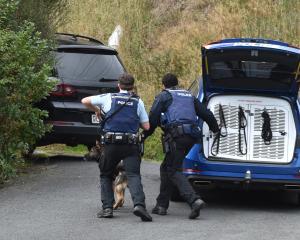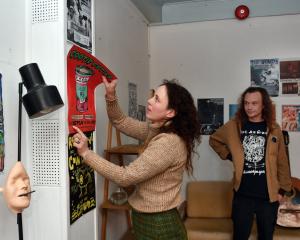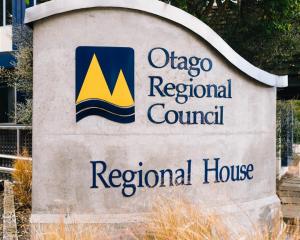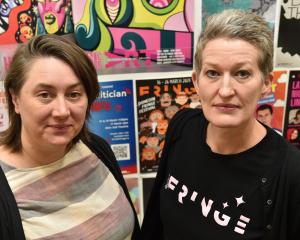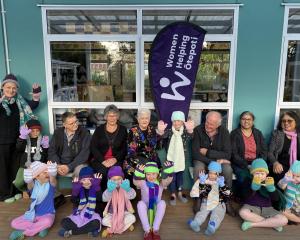The Dunedin lawyer with a passion for fashion has been the driving force behind the event for the past 13 years, helping to grow it from a small, one-off event to an international week of fashion events.
It has not been easy. There are no year-round full-time employees, and funding is a constant challenge.
But determination, hard work and hundreds of voluntary hours have seen it become a landmark event for the city.
Ms Staley (51) laughingly spoke of how the small organising committee was once described as ''a bossy group of women who get things done''. ''I think we're determined, rather than bossy,'' she said.
She was quick to point out that it was a team effort and it involved a ''little tight team'' in which everyone had their roles.
But when she was tired, reflecting on the close of yet another event, she would look down the catwalk on the Dunedin Railway Station platform, with fairy lights twinkling overhead, and think: ''this is quite good, isn't it?''
Ms Staley was thrilled with the success of this year's event, which attracted plenty of buy-in.
''We knew building up to it, it was looking huge. Tickets sold really well, there was a lot of vibe around. We heard lots of people were coming from out of town.
''I think people were ready for a good time in Dunedin; it just felt like that. People were interested in something positive ... the weather helped. It showed off Dunedin in a good light,'' she said.
Acknowledging that it was a massive time commitment, involving hard work and sleepless nights, she never stopped thinking about iD - which was necessary, given there was such a short time-frame.
The event showed off Dunedin's history but it also showed off the future of the city, in which Ms Staley has spent most of her life.
Born in Auckland, she lived in England from about about the age of 5 and moved to Dunedin in her early teens.
After leaving Logan Park High School, she did not go straight to university, but instead got got a job as a clerk in a law firm.
Becoming a lawyer was not something that she had always had her heart set on.
''I certainly didn't have a burning desire to be a Rumpole of the Bailey or an Ally McBeal,'' she joked, but she always vaguely thought that law looked interesting.
She enjoyed her time at the law firm and, with an interest in politics, she headed to the University of Otago for a double-degree in law and arts.
But then she thought she better concentrate on ''something that might earn a living'' and graduated a bachelor of laws in 1988.
While she did not actively set out to be a business lawyer, it soon became apparent that she had ''some sort of natural bent'' for the business side of law.
She later became a partner at Ross Dowling Marquet Griffin and then established Staley Cardoza Lawyers, with Rachel Cardoza, in 1998, the first female legal partnership in Otago.
Looking back, it was quite a big step, establishing a firm during a ''tough time'' in the city. But what started with two had now grown to 12.
The partnership had grown as she had juggled her legal work with family commitments - she has a 23-year-old son Christopher - and also various board appointments.
But it was all about interesting work and that was why she liked being on boards. It added another interest level to her life and provided intellectual stimulation.
''What I quite like and have liked about the boards is that strategic thinking and nothing stays the same,'' she said.
Ms Staley's first - and also her biggest - appointment was being elected to the board of Tower in 1996.
''That was an experience you can't buy. It stood me in good stead for going forward,'' she said.
Just 33 at the time, she was one of two women on the board and the youngest by a long way.
She was chairwoman of Maritime New Zealand from December 2002 until she retired in January 2010, a tenure of which she was very proud.
During that period, the entity took on additional roles, such as responsibility for the Rescue Co-ordination Centre for New Zealand, which followed the Time Out boating tragedy off the coast of North Otago, and there was also a restructure and reorganisation of the organisation.
She was head of the New Zealand delegation to the International Maritime Organisation in London, a United Nations body.
Ms Staley enjoyed her involvement in the rural sector - ''it's the lifeblood of New Zealand'' - which included being on the board of Reid Farmers, which later merged with Pyne Gould Guinness, which subsequently merged with Wrightson to become PGG Wrightson, and an agricultural biotechnology company.
She has also been on various other boards, including being a director of Dunedin International Airport.
As well as chairing the iD committee, she is also chairwoman of Chatsford Management Ltd, a private company that runs the Chatsford retirement complex at Mosgiel, and a member of the University of Otago School of Business advisory board.
She was available for and always interested in other board opportunities, she said.
Asked what attributes were required to be a good director, Ms Staley said you had to want to do it and also understand what you were getting yourself in for.
You needed to be collegial but firm and it also required ''learning your stuff''.
''It's understanding what you're there for and then understanding the business but not running the business.
A prominent director once told her that one of the major assets of a good director was being able to think.
There were times when it was tough and you had to be unafraid of speaking up, but in a constructive and fair way.
''When the going gets tough, you do need to be able to work through that stuff,'' she said.
''Not everyone on the board needs to know everything about the business but you should make it your business ... to spend some time in the business and then understand what your role is,'' she said.
She believed the particular skills on a board were now looked at a lot more, which was a good thing.
She would never go on a board unless she felt there was someone on it that had specific financial training.
When it came to women on boards, Ms Staley believed it had perhaps been harder for women to get their first appointment.
''I still think women are judged on a different standard. I'm possibly not in the camp that says there's no such thing as a glass ceiling,'' she said.
Asked about her vision for Dunedin, Ms Staley said her first vision was more jobs.
When she was president of the Otago Chamber of Commerce from 1997 to 1999, she had a vision that if a percentage of graduates from the city's tertiary institutes could be held in Dunedin and gain a meaningful job, ''imagine what this town would look like''.
While acknowledging that she did not have all the answers, Ms Staley said the city did need to be more vibrant and: ''people can't do anything unless they've got a job''.
It needed to play to its strengths - and those strengths clearly were education'' - and leverage off them in a clever way, while also recognising its limitations.
''We need to sell what we actually have. We need to be pushing the great things about it.
''You can have a successful positive life here but people should earn money. We shouldn't be afraid to say we should earn a decent living,'' she said.
A finalist in the inaugural Women of Influence Awards last year, Ms Staley shrugged off any suggestion of a ''superwoman'' tag.
''I'm no superwoman. I think I'm quite organised. I think I probably have quite a short attention span. I always need something else, I like to be busy. It's nice to be busy'' she said.




